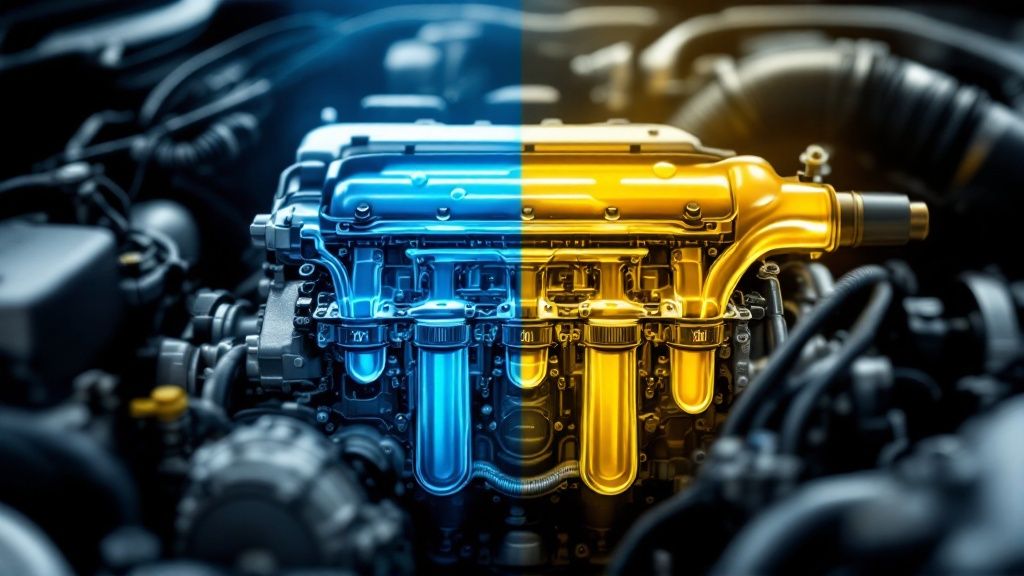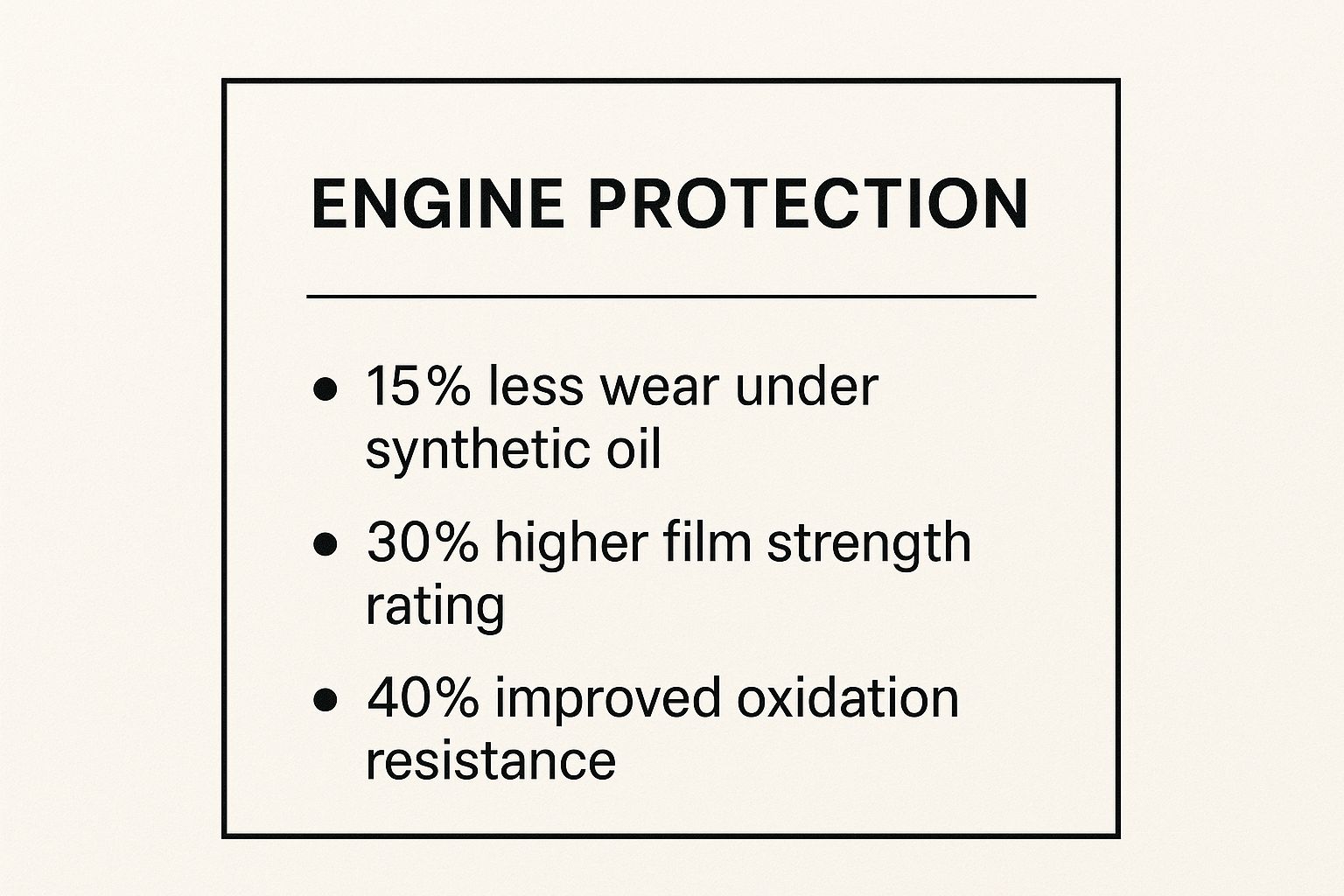Choosing the right motor oil is crucial for your vehicle's health and your budget. This listicle clarifies the six key differences between synthetic and conventional oil, helping Dallas drivers and fleet managers make informed decisions. Learn how each type affects engine performance, longevity, and maintenance costs, ultimately guiding you toward the best oil for your needs, whether it's peak performance or maximum fuel efficiency. Understanding synthetic vs. conventional oil is essential for proper vehicle maintenance.
The core difference between synthetic and conventional motor oils lies in their fundamental building blocks: their base oil composition. This distinction is the primary reason why one oil performs differently from the other and why understanding it is crucial for Dallas drivers and fleet managers alike. Conventional oils are derived directly from crude oil through a refining process. This process removes impurities and separates the oil into different viscosity grades, but the resulting product still contains a variety of hydrocarbon molecules of varying lengths and structures. Synthetic oils, on the other hand, are meticulously engineered from pure chemical compounds in a controlled laboratory environment. This allows for a uniform molecular structure and tailored performance characteristics not achievable with conventional refining. This foundational difference affects everything from viscosity stability at high temperatures to resistance to oxidation and deposit formation.

Conventional oils are categorized into Group I, II, and III base oils according to the American Petroleum Institute (API) classification system. Group I base oils are the least refined, while Group III oils undergo more extensive processing and are sometimes marketed as "synthetic blends." True synthetic oils fall into Group IV (Polyalphaolefins or PAOs) and Group V (esters and other synthetics). Companies like Mobil 1, a pioneer in synthetic oil technology, utilize proprietary synthetic base stocks and additive packages to create high-performance motor oils. For instance, Mobil 1's use of PAO base oils contributes to their excellent low-temperature flow and high-temperature stability.
Features Comparison:
Pros and Cons:
| Feature | Synthetic | Conventional |
|---|---|---|
| Performance | More consistent, targeted benefits | Can vary depending on crude oil source |
| Quality Control | Higher due to controlled manufacturing | Lower due to inherent impurities |
| Cost | Higher manufacturing costs | Lower manufacturing costs |
| Environmental | More energy-intensive production | Less energy-intensive production |
| Natural Properties | May lack some beneficial natural properties | Retains some potentially beneficial natural properties |
Actionable Tips for Dallas Drivers:
Base oil composition is the most critical factor to consider when comparing synthetic vs. conventional oil. Understanding this fundamental difference empowers Dallas residents and fleet managers to make informed decisions about protecting their vehicles, optimizing performance, and maximizing the life of their engines. This knowledge is key whether you are looking for routine oil changes, preventive maintenance, or preparing for a state inspection in the city of Dallas.
One of the most critical differences between synthetic and conventional oil lies in their viscosity performance. Viscosity refers to a fluid's resistance to flow. Think of it like this: honey has high viscosity, while water has low viscosity. For your engine, the right viscosity is crucial. It ensures proper lubrication and protection across a range of operating temperatures. When choosing between synthetic vs conventional oil, viscosity plays a major role.

Synthetic oils are engineered to maintain a more stable viscosity across a broader temperature range than conventional oils. Conventional oils tend to thicken in cold weather, making it harder for the engine to turn over during cold starts. Conversely, they thin out excessively in high heat, reducing their lubricating and protective qualities. This viscosity breakdown can lead to increased engine wear and tear. Synthetics, on the other hand, resist these changes, providing consistent lubrication from frigid Dallas winters to scorching summer heat. This stability is due to their uniform molecular structure and the use of fewer viscosity index improvers, additives that help maintain viscosity across temperature fluctuations. While both synthetic and conventional oils can offer multi-grade capabilities (like 5W-30), synthetics inherently maintain their multi-grade performance more effectively over time.
Examples of the superior viscosity performance of synthetic oils are numerous. A 0W-20 synthetic oil can easily flow and lubricate engine components even at temperatures as low as -40°F, ensuring smooth cold starts even on the coldest Dallas mornings. High-performance synthetics like Castrol EDGE are engineered to maintain their viscosity and protective film at extreme high temperatures, upwards of 400°F, protecting your engine during intense driving conditions. Conversely, a conventional 10W-30 oil might thicken significantly below 0°F, potentially hindering cold starts and causing increased engine wear.
Pros of Synthetic Oil's Viscosity Performance:
Cons of Conventional Oil's Viscosity Performance:
Tips for Choosing the Right Oil Viscosity:
The SAE (Society of Automotive Engineers) viscosity rating system, innovations like Pennzoil Ultra Platinum with PurePlus Technology, and Castrol with Fluid Titanium Technology, have all contributed to a better understanding and improvement of oil viscosity performance. This factor alone earns viscosity performance a prominent place in the synthetic vs. conventional oil debate, especially for Dallas drivers.
When comparing synthetic vs conventional oil, the most critical factor is how effectively the oil protects your engine from wear and tear. This protection is the primary function of motor oil, safeguarding your engine's intricate components from friction, heat, and the accumulation of harmful deposits. Synthetic oils generally offer superior protection due to their enhanced molecular structure and additive packages. This translates to better film strength, detergency, and resistance to oxidation and thermal breakdown – all crucial for minimizing friction, wear, and extending the life of your engine.

The infographic above provides a quick reference summarizing the key benefits of synthetic oil in terms of engine protection: enhanced film strength, superior resistance to sludge and oxidation, and ultimately, reduced engine wear. This enhanced protection is especially important in demanding conditions.
Specifically, synthetic oils maintain a stronger oil film between moving parts, even under extreme temperatures and pressures. This superior film strength is crucial during “boundary lubrication” conditions, where metal-to-metal contact is more likely, such as during cold starts or high-performance driving. Furthermore, the enhanced detergency and oxidation resistance of synthetics help keep the engine cleaner by preventing sludge and varnish buildup, which can restrict oil flow and contribute to increased wear.
Several industry tests demonstrate the wear reduction benefits of synthetic oils. For instance, the Sequence IIIH test has shown that Mobil 1 synthetic oil can reduce engine wear by up to 15% compared to conventional oils. Shell Rotella, a popular synthetic for diesel engines, provides heavy-duty protection in demanding commercial applications. Valvoline has also conducted testing demonstrating the reduced timing chain wear achieved with synthetic oils. Learn more about Engine Protection and Wear Reduction
Pros of Synthetic Oil for Engine Protection:
Cons of Synthetic Oil for Engine Protection:
Tips for Choosing the Right Oil:
Whether you’re a Dallas resident navigating city traffic or managing a commercial fleet across Texas, choosing the right motor oil plays a vital role in engine longevity and performance. While high-quality conventional oils may provide adequate protection for normal use, the superior performance and wear protection offered by synthetics can be a worthwhile investment for many drivers, especially those seeking to maximize engine life and minimize maintenance costs. Companies like Lubrizol and Afton Chemical, key additive manufacturers, contribute significantly to the advancement of oil technology, while organizations like API and ILSAC establish certification standards to ensure quality and performance. Amsoil, a pioneer in synthetic lubricants, has long championed the importance of wear protection, further highlighting the critical role oil plays in engine health.
One of the key considerations when comparing synthetic vs. conventional oil is how often you'll need to change it. This impacts both your maintenance budget and the time you spend at the shop. Oil change intervals are significantly affected by the type of oil you choose, as synthetic and conventional oils degrade at different rates. Synthetic oils are engineered to resist breakdown, oxidation, and sludge formation, allowing for significantly longer intervals between changes compared to their conventional counterparts. This longevity stems from their more refined molecular structure and enhanced additive packages.

While conventional oils generally require changes every 3,000-5,000 miles, synthetic oils can often last between 7,500 and 15,000 miles. This extended performance translates to fewer oil changes over the life of your vehicle, which can add up to significant savings in both time and money. Furthermore, using less oil contributes to a reduction in waste oil, making synthetic oil a potentially more environmentally friendly choice.
For a deeper understanding of the factors affecting oil change frequency, including driving conditions and vehicle type, this ultimate guide to oil change frequency provides a wealth of information.
Several automakers have embraced the extended intervals permitted by synthetic oil. For example, BMW often recommends 15,000-mile intervals for vehicles using synthetic oil. However, other manufacturers, like Toyota, remain more conservative, suggesting intervals between 5,000 and 10,000 miles, even with synthetic oil. Some specialized synthetic oils, such as Mobil 1 Annual Protection, even claim to offer up to 20,000 miles of protection. These differing recommendations highlight the importance of consulting your owner's manual for the specific requirements of your vehicle.
While synthetic oils offer extended change intervals, there are some caveats. These longer intervals may not be suitable for vehicles operating under severe conditions, such as frequent stop-and-go driving, towing heavy loads, or driving in extreme temperatures. Additionally, although synthetic oil offers long-term savings, the upfront cost per quart is typically higher than conventional oil. Finally, it's worth noting that some manufacturers recommend adhering to standard oil change intervals regardless of the oil type used.
Tips for Determining Your Oil Change Interval:
The shift toward longer oil change intervals is a notable aspect of the synthetic vs. conventional oil debate. Understanding the benefits and limitations of extended intervals is crucial for maximizing your vehicle's performance and longevity while potentially minimizing maintenance costs and environmental impact. Whether you choose synthetic or conventional, adhering to the proper oil change interval for your specific vehicle and driving conditions is paramount.
When debating synthetic vs. conventional oil, the price difference is often the first thing that comes to mind. This cost comparison necessitates a thorough value analysis. While it's true that synthetic oils typically command a premium price, costing anywhere from $8-12 per quart compared to $3-5 for conventional oil, the long-term cost implications aren't always so straightforward. Understanding the value proposition is key to making an informed decision. Learn more about Cost Considerations and Value Analysis
The extended service intervals offered by synthetic oils are a core component of their value. Synthetics can often last two to three times longer between changes, effectively reducing the lifetime maintenance costs associated with more frequent conventional oil changes. This means fewer oil filters to purchase and less mechanic time (or your own time) spent performing the change. This is particularly relevant for Dallas residents and those in the city of Dallas who face the daily grind of traffic and want to minimize vehicle downtime.
Beyond extended intervals, the potential for fuel economy improvements further contributes to the synthetic oil value proposition. While the percentage improvement might be modest (often cited as 1-2%), over the lifespan of a vehicle, these small gains can accumulate into noticeable savings, especially for high-mileage drivers or commercial fleet managers in Dallas seeking reliable fleet maintenance programs. For budget-conscious customers, even these marginal savings can make a difference.
The enhanced protection offered by synthetic oil also plays a vital role in the value analysis. Synthetic oils are engineered to better withstand high temperatures and resist breakdown, leading to reduced engine wear. This can translate to improved long-term value by potentially minimizing the need for costly engine repairs down the road. This is a crucial consideration for car owners in need of routine oil changes and preventative maintenance, as well as for those requiring state inspections and compliance checks.
Pros:
Cons:
Examples:
Tips for Dallas Drivers and Fleet Managers:
This cost and value analysis is essential for all vehicle owners, from individual drivers in Dallas to commercial fleet managers. By understanding the long-term implications and employing the tips provided, you can make an informed decision about which type of oil best suits your needs and budget.
When deciding between synthetic vs conventional oil, environmental impact is a crucial factor to consider. The choice extends beyond simply how you dispose of used oil; the entire lifecycle – from production to performance and finally disposal – contributes to each oil type's environmental footprint. Learn more about Environmental Impact Considerations
Synthetic oil production, for instance, is more energy-intensive than conventional oil production, resulting in a higher initial carbon footprint. However, synthetic oil's longer service life and potential for improved fuel economy can offset this initial impact over time. Because you change synthetic oil less frequently, you produce less waste oil overall. This reduced volume contributes to a smaller environmental burden compared to more frequent conventional oil changes. Furthermore, the improved fuel economy offered by synthetic oil can translate into lower overall carbon emissions throughout the vehicle's life.
Here's a breakdown of the environmental considerations:
Features of Synthetic vs. Conventional Oil (Environmental Impact):
Pros of Synthetic Oil (Environmental Perspective):
Cons of Both Oil Types (Environmental Perspective):
Examples of Eco-Friendly Oil Options:
Tips for Minimizing Environmental Impact:
For Dallas residents and city of Dallas fleet managers seeking to reduce their environmental impact, choosing the right oil—whether synthetic or conventional—and adhering to proper disposal methods are crucial steps. Commercial fleet managers in particular can benefit from considering the long-term environmental and economic benefits of synthetic oil, especially for vehicles operating under heavy-duty cycles. While the upfront cost of synthetic oil might be higher, the extended drain intervals and potential fuel savings can contribute to long-term cost reductions and a smaller environmental footprint for their fleets.
| Aspect 💡 | Base Oil Composition 🔄 | Viscosity Performance ⚡ | Engine Protection & Wear Reduction ⭐📊 | Oil Change Intervals ⚡ | Cost Considerations and Value Analysis 💡 | Environmental Impact Considerations 💡 |
|---|---|---|---|---|---|---|
| Implementation Complexity 🔄 | High energy use in synthetic production | Moderate, multi-grade tech in both types | Advanced additive packages in synthetics | Moderate, depends on oil monitoring tech | Moderate, depends on purchase and maintenance | Higher initial footprint in synthetic manufacture |
| Resource Requirements | Synthetic needs pure chemicals & energy | Less viscosity improvers needed in synthetic | Premium additives for wear resistance | Longer usage reduces oil volume consumed | Higher upfront cost for synthetics | Synthetic production is more energy-intensive |
| Expected Outcomes 📊 | Uniform molecular structure improves quality | Stable viscosity protects engine at extremes | Up to 15% less engine wear; longer engine life | Extended intervals up to 15,000 miles | Long-term savings and reduced maintenance hassle | Reduced waste oil and emissions over lifecycle |
| Ideal Use Cases 💡 | High-performance & consistent quality needs | Extreme temperature environments | Turbocharged/high-performance engines | Long-distance and usage-intensive drivers | Newer vehicles kept long-term | Environmentally-conscious users seeking reduced waste |
| Key Advantages ⭐ | Consistent performance & targeted traits | Better cold-start & heat stability | Superior film strength & oxidation resistance | Fewer oil changes, lower maintenance frequency | Potential fuel economy & repair cost savings | Less frequent changes & improved fuel efficiency |
Choosing between synthetic vs conventional oil is a crucial decision for any vehicle owner in Dallas and beyond. This article has explored key differences, from base oil composition and viscosity performance to engine protection, oil change intervals, cost, and environmental impact. Understanding these factors is essential for maximizing your vehicle's performance, longevity, and efficiency. Whether you prioritize the enhanced wear protection and extended drain intervals of synthetic oil or the affordability of conventional oil, making the informed choice empowers you to protect your investment and contribute to a healthier environment.
The optimal choice depends on a complex interplay between your vehicle's specific needs, your driving habits, and your budget. Factors like the age and make of your car, the city of Dallas's driving conditions, and your individual driving style all contribute to the equation. Mastering these concepts ensures you're not just putting oil in your engine, but actively contributing to its long-term health and performance. This translates directly to fewer repairs, better fuel economy, and a smoother, more reliable driving experience.
For personalized advice tailored to your vehicle and driving conditions, consult the experts at Kwik Kar Oil Change and Auto Care. Our knowledgeable technicians in the city of Dallas can help you navigate the synthetic vs conventional oil debate and determine the perfect oil for your specific needs. Visit Kwik Kar Oil Change and Auto Care to schedule an appointment and ensure your vehicle receives the best possible care.


Get upto $20 OFF on all services.